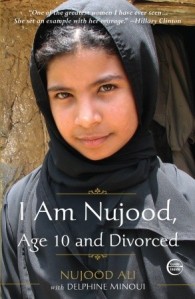 Overview: Forced by her father to marry a man three times her age, young Nujood Ali was sent away from her parents and beloved sisters and made to live with her husband and his family in an isolated village in rural Yemen. There she suffered daily from physical and emotional abuse by her mother-in-law and nightly at the rough hands of her spouse. Flouting his oath to wait to have sexual relations with Nujood until she was no longer a child, he took her virginity on their wedding night. She was only ten years old.
Overview: Forced by her father to marry a man three times her age, young Nujood Ali was sent away from her parents and beloved sisters and made to live with her husband and his family in an isolated village in rural Yemen. There she suffered daily from physical and emotional abuse by her mother-in-law and nightly at the rough hands of her spouse. Flouting his oath to wait to have sexual relations with Nujood until she was no longer a child, he took her virginity on their wedding night. She was only ten years old.
Unable to endure the pain and distress any longer, Nujood fled—not for home, but to the courthouse of the capital, paying for a taxi ride with a few precious coins of bread money. When a renowned Yemeni lawyer heard about the young victim, she took on Nujood’s case and fought the archaic system in a country where almost half the girls are married while still under the legal age. Since their unprecedented victory in April 2008, Nujood’s courageous defiance of both Yemeni customs and her own family has attracted a storm of international attention. Her story even incited change in Yemen and other Middle Eastern countries, where underage marriage laws are being increasingly enforced and other child brides have been granted divorces.
My thoughts: Nujood’s family is plagued by problems, and some of those problems are poverty and the fear of adultery. To counter these issues, Nujood’s Aba decides to marry her to a 30-year-old man, whom promises to wait until she hits puberty to consummate the union. That man doesn’t keep his promises, and Nujood is left with nightmares, bruises, and anguish.
This book delves further than just Nujood’s terrifying marriage, it also follows up with her siblings’ struggles. It’s interesting how the book gives you an idea of other problems Yemen has, like trafficking, poverty, lack of education, early marriages, and so on. I know now more about Yemen than I did before.
I think the book is very good at depicting some of the problems, like poverty, but it doesn’t fully explain village customs or why those themes matter. As a non-Muslim reading this book, I don’t understand how honor works in Islam, and this book fails to put Islamic practices into perspective for others.
The book does provide notes at the end of the story, and so some things are explained further. I think it’s cool how links are provided in the text to the notes at the back of the kindle edition, but then you can’t get back to the section you were reading in the story unless you scroll back or jump there by entering the page or location number.
The biggest problem I have with this story is that there seems to be two narrators, and their voices don’t converge even though Nujood is the only one telling the story. On one hand, there’s ten-year-old Nujood, and then there seems to be a more mature educated Nujood. Maybe it’s a translation issue, but for a 10-year-old girl who’s barely literate, there are too many larger words and too many complex sentences. Maybe Nujood really does speak that way, but it doesn’t logically make sense to me. I think the journalist had more to do with the writing than Nujood did. The journalist tries to see things from Nujood’s 10-year-old girls, but then switches back to her older eyes. It causes the writing to seem jagged in some areas.
I borrowed this book from the library and read it on my kindle.


